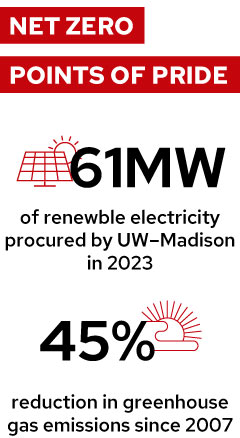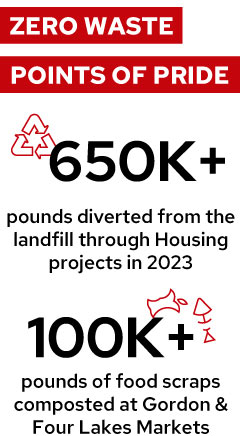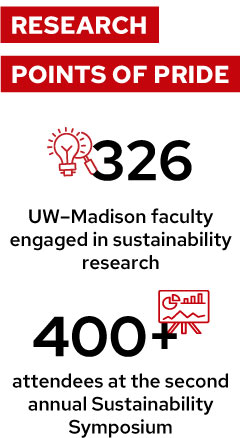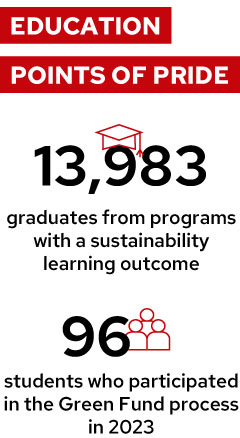For decades, the Nelson Institute for Environmental Studies and the Office of Sustainability have tackled critical environmental and sustainability challenges in service of UW–Madison, the state of Wisconsin, and the planet. Now, both units are leading the way as the UW embarks on its most ambitious, comprehensive environmental sustainability initiative. Announced earlier this year by Chancellor Jennifer L. Mnookin, the cross-campus initiative will advance the university’s research and education missions while also making campus a living laboratory for sustainable practices.
“This is a landmark initiative,” said Nathan Jandl, associate director of sustainability. “UW–Madison has the opportunity to build on its legacy of environmental leadership and leverage widespread interest among its stakeholders — from prospective students and community members to Badger alumni — in creating a sustainable campus and helping to build a liveable world for all.”
The initiative includes five overarching goals: eliminating emissions and waste, increasing campus involvement, boosting sustainability research, and integrating sustainability into the curriculum. Many of the goals already have efforts under way; read on to learn about our progress so far.
 Net-Zero* Emissions by 2048
Net-Zero* Emissions by 2048
UW–Madison is planning for climate action with the Wisconsin Idea top of mind: centering people, viewing our campus and outlying lands as a living learning lab that benefits students and researchers, and working cooperatively with the private sector, our neighbors, and local communities to honor the contributions of our alumni and inspire the leaders of tomorrow.
How We’re Getting There
Our goal of 2048 coincides with the university’s 200th anniversary while also aligning with recommendations from the Intergovernmental Panel on Climate Change as well as the City of Madison’s 2050 goal and the Wisconsin Clean Energy Plan. UW–Madison has also set an interim target of 100 percent renewable electricity by 2030 — an ambitious yet critical step on the path to net-zero emissions.
*Net Zero refers to the state in which the greenhouse gasses going into the atmosphere are balanced by removal out of the atmosphere. At UW–Madison, we must:
- Reduce our direct carbon emissions on campus (heating and cooling, campus-owned vehicles and equipment, refrigerants, and chemicals)
- Reduce our indirect carbon emissions from electricity produced off-campus
- Reduce our indirect carbon emissions from other sources
- Increase positive actions that reduce our carbon footprint (carbon sequestration, carbon offsets, etc.)
 Zero Waste* by 2040
Zero Waste* by 2040
By integrating sustainable materials management practices, UW–Madison is taking a transformative approach to help build a circular economy.
How We’re Getting There
UW Zero Waste is a strategic initiative for sustainable materials management at the University of Wisconsin–Madison. The initiative utilizes cross-functional collaboration in order to achieve several outcomes, including:
- Minimize waste generation
- Promote sustainable purchasing
- Save financial resources
- Yield social benefits
- Create a culture of environmental responsibility across the university
*Zero Waste means achieving a series of targets related to sustainable materials management. Visit the UW Zero Waste website to learn more.
 Cross-Campus Involvement: Achieve STARS Gold by 2025
Cross-Campus Involvement: Achieve STARS Gold by 2025
Shared knowledge and training, behavior change, and engagement from all corners of campus are essential in creating a culture of campus sustainability.
How We’re Getting There
UW–Madison uses the Sustainability Tracking, Assessment & Rating System (STARS) to assess progress and use established metrics to ensure that sustainability efforts are reaching all corners of campus. STARS is a comprehensive sustainability rating system for colleges and universities that addresses the environmental, social, and economic dimensions of sustainability. Sustainability efforts across campus are divided into four categories: planning and administration, academics, operations, and engagement. Each category includes secondary and tertiary categories for which sustainability efforts are measured and points are accrued. You can learn more about UW–Madison’s current Silver rating on the sustainability dashboard.
 Sustainability Research and Innovation
Sustainability Research and Innovation
UW–Madison is working to solve wicked problems in sustainability by advancing foundational and applied research, making campus a living lab, building innovative partnerships, and leveraging funding resources.
How We’re Getting There
Nearly half of all academic departments and more than 320 faculty members at UW–Madison participate in sustainability-related research, making major contributions to scholarship in air quality and energy, global health and climate change, and environmental justice and food systems, among other topics.
To support innovative, large-scale, cross-cutting sustainability research on campus and beyond, UW–Madison launched the Sustainability Research Hub in spring 2024, which will make the university a preeminent destination for environmental sustainability research and education.
 Immersive Sustainability Education Opportunities by 2030
Immersive Sustainability Education Opportunities by 2030
Extensive curriculum integration helps create a culture of sustainability where classroom and hands-on learning opportunities educate a generation that has their eye on the future.
How We’re Getting There
UW–Madison offers an array of sustainability education opportunities, from certificates and courses to experiential learning in the form of Green Fund projects and internships. By using a campus-wide sustainability literacy assessment and incorporating feedback from prospective and current students as well as employers on the value of sustainability education, the university will expand its offerings until all interested students have access to immersive sustainability educational opportunities.
Track our Progress: Sustainability Dashboard
The Office of Sustainability uses a transparent and collaborative process to assess and document university sustainability progress. This dashboard tracks progress using metrics included in the Sustainability Tracking, Assessment, and Rating System (STARS) assessment.
The dashboard is organized around the four main categories of the STARS framework: academics, engagement, operations, and planning and administration. You can view these categories to explore data on a wide variety of campus sustainability efforts, or you can jump to specific data tracking progress against the chancellor’s sustainability goals here.
Learn about the UW’s Sustainability Efforts at Earth Fest
Earth Fest Kickoff Celebration
Friday, April 19 | 1:30–6 p.m.*
Learn more
*Panel on UW energy transition at 3:55p.m.